Reflection Report: Gibbs Reflective Cycle and Learning Experience
VerifiedAdded on 2021/02/20
|11
|2469
|71
Report
AI Summary
This report details a student's individual reflection on their module learning experience, structured around Gibbs' reflective cycle. The report begins with an introduction outlining the importance of goal setting and skill development for effective learning. It then delves into the application of Gibbs' reflective model, describing the learning experience, feelings during the process, evaluation of the experience, conclusions drawn, and an action plan for future learning. The student reflects on the development of skills such as communication, writing, and teamwork, and the impact of these skills on their academic and professional development. The report emphasizes the importance of self-motivation, confidence, and identifying strengths and weaknesses. The conclusion summarizes the key learnings from the reflection and outlines a plan for future learning, including the application of Belbin's team roles and strategies for continuous improvement.
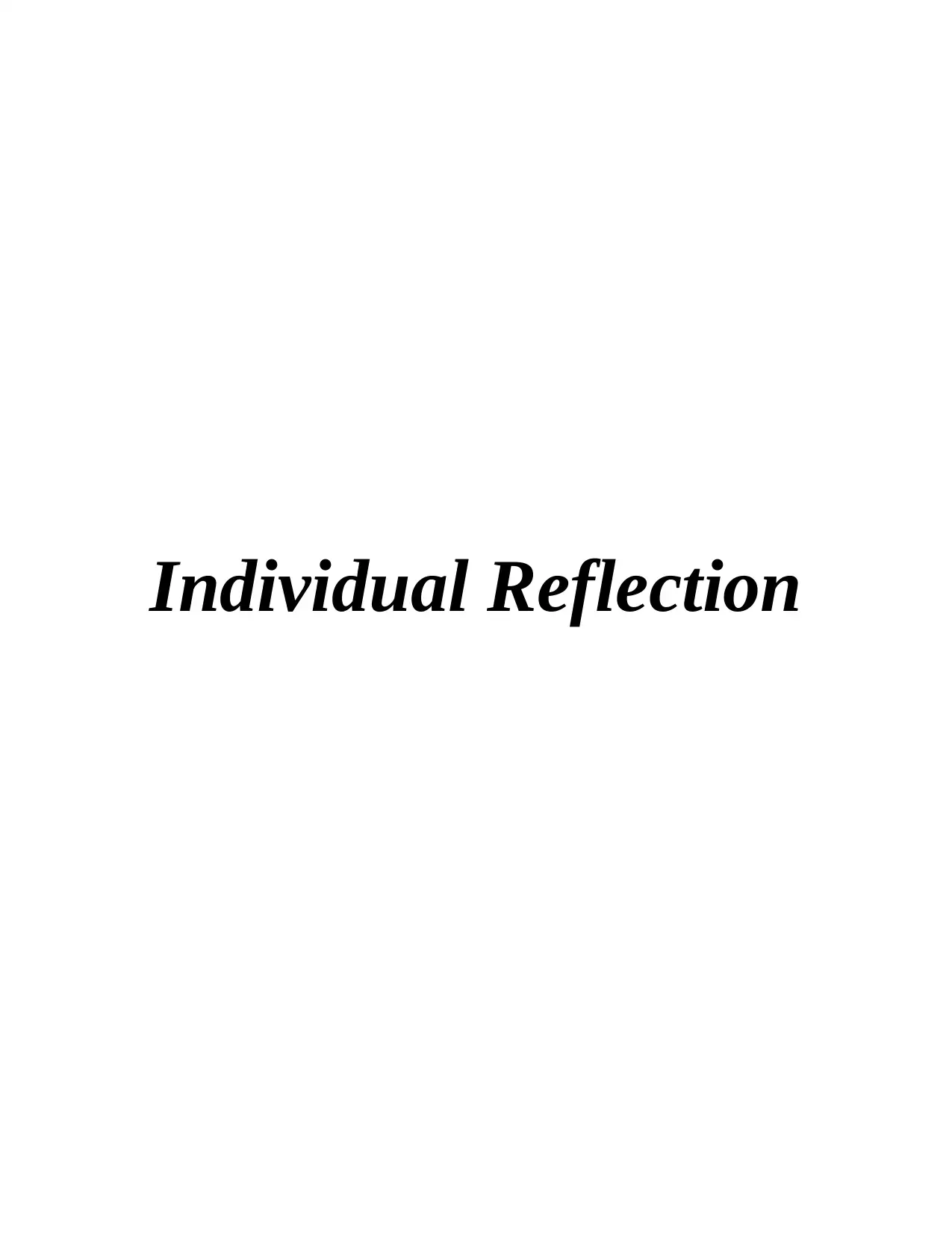
Individual Reflection
Paraphrase This Document
Need a fresh take? Get an instant paraphrase of this document with our AI Paraphraser
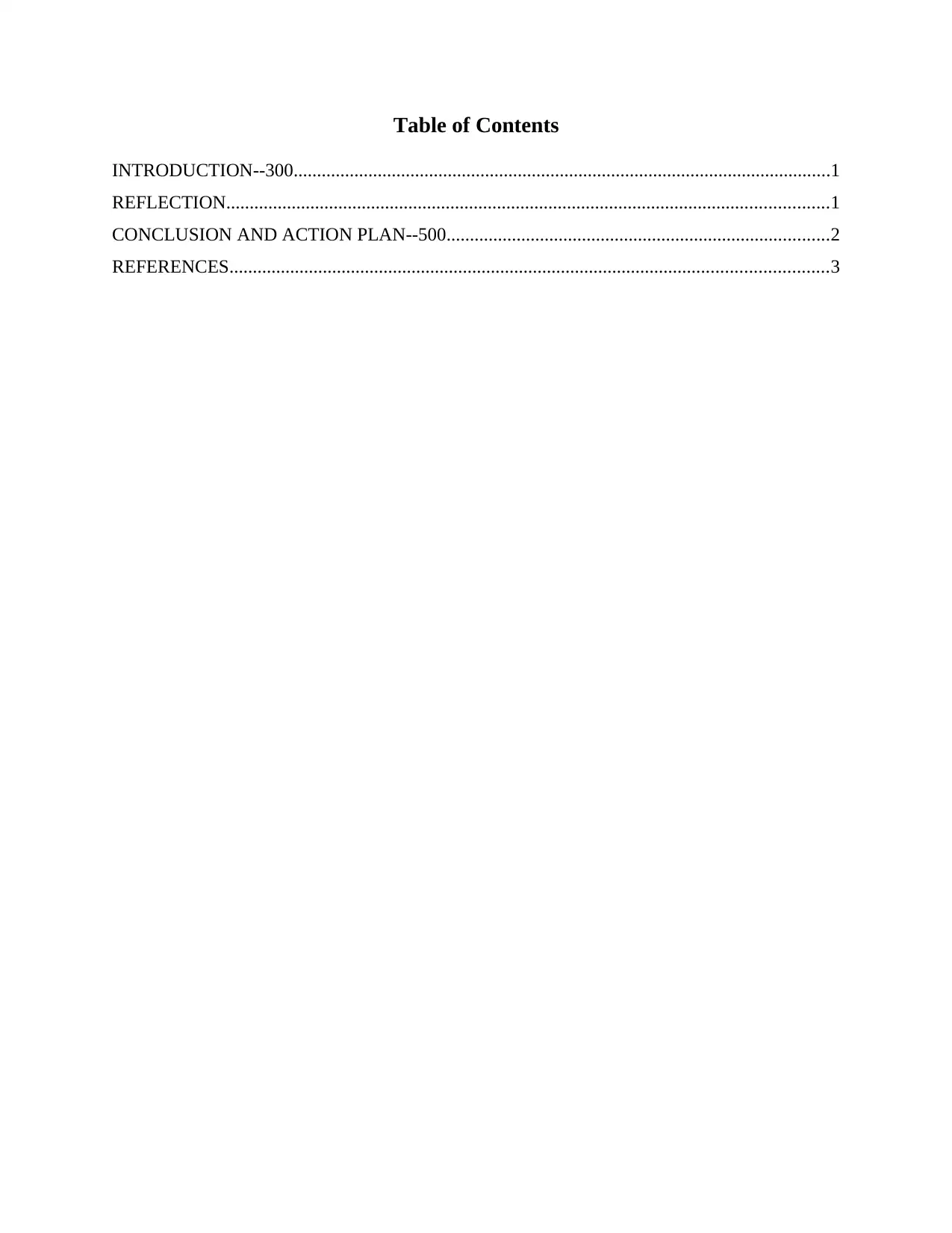
Table of Contents
INTRODUCTION--300...................................................................................................................1
REFLECTION.................................................................................................................................1
CONCLUSION AND ACTION PLAN--500..................................................................................2
REFERENCES................................................................................................................................3
INTRODUCTION--300...................................................................................................................1
REFLECTION.................................................................................................................................1
CONCLUSION AND ACTION PLAN--500..................................................................................2
REFERENCES................................................................................................................................3

⊘ This is a preview!⊘
Do you want full access?
Subscribe today to unlock all pages.

Trusted by 1+ million students worldwide
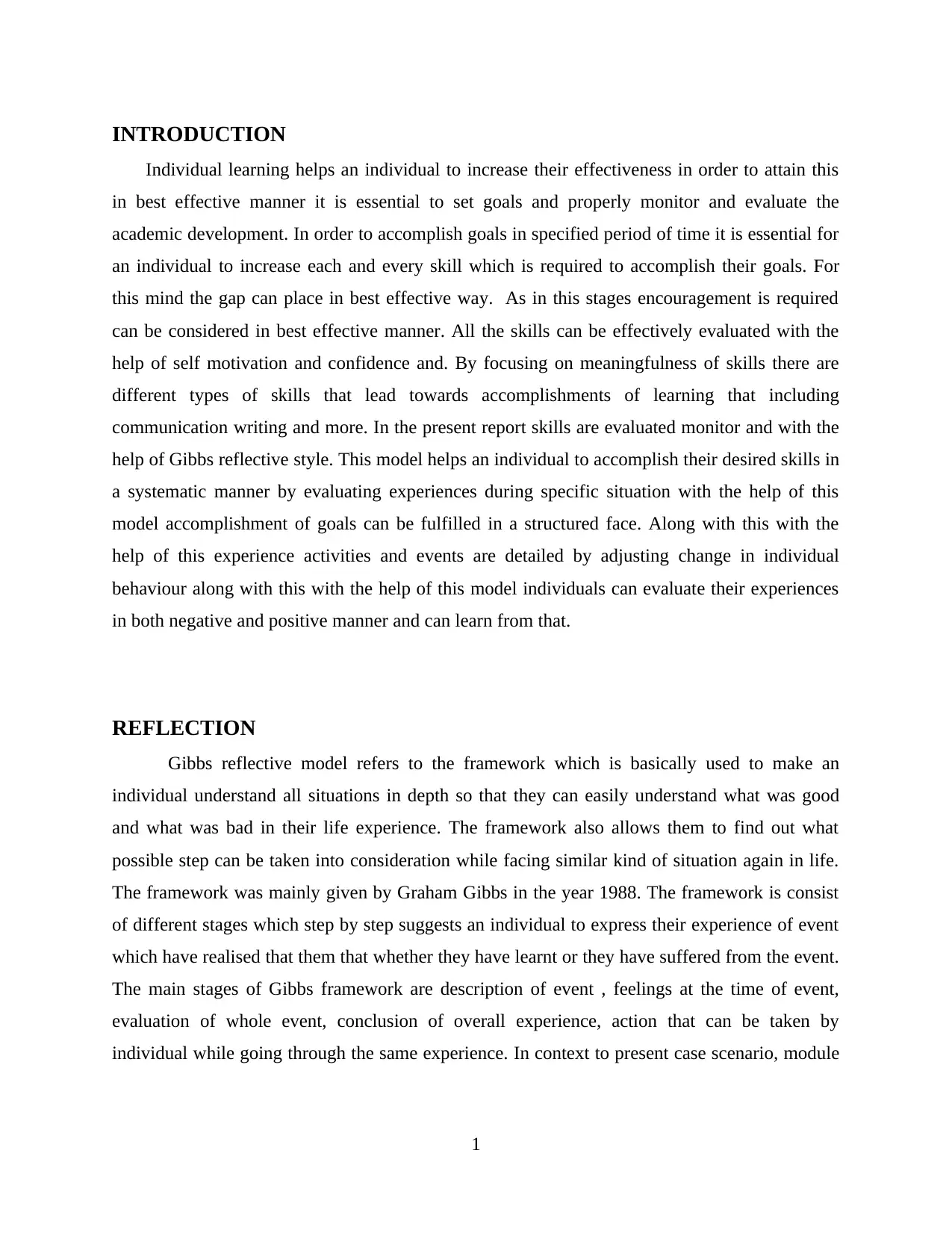
INTRODUCTION
Individual learning helps an individual to increase their effectiveness in order to attain this
in best effective manner it is essential to set goals and properly monitor and evaluate the
academic development. In order to accomplish goals in specified period of time it is essential for
an individual to increase each and every skill which is required to accomplish their goals. For
this mind the gap can place in best effective way. As in this stages encouragement is required
can be considered in best effective manner. All the skills can be effectively evaluated with the
help of self motivation and confidence and. By focusing on meaningfulness of skills there are
different types of skills that lead towards accomplishments of learning that including
communication writing and more. In the present report skills are evaluated monitor and with the
help of Gibbs reflective style. This model helps an individual to accomplish their desired skills in
a systematic manner by evaluating experiences during specific situation with the help of this
model accomplishment of goals can be fulfilled in a structured face. Along with this with the
help of this experience activities and events are detailed by adjusting change in individual
behaviour along with this with the help of this model individuals can evaluate their experiences
in both negative and positive manner and can learn from that.
REFLECTION
Gibbs reflective model refers to the framework which is basically used to make an
individual understand all situations in depth so that they can easily understand what was good
and what was bad in their life experience. The framework also allows them to find out what
possible step can be taken into consideration while facing similar kind of situation again in life.
The framework was mainly given by Graham Gibbs in the year 1988. The framework is consist
of different stages which step by step suggests an individual to express their experience of event
which have realised that them that whether they have learnt or they have suffered from the event.
The main stages of Gibbs framework are description of event , feelings at the time of event,
evaluation of whole event, conclusion of overall experience, action that can be taken by
individual while going through the same experience. In context to present case scenario, module
1
Individual learning helps an individual to increase their effectiveness in order to attain this
in best effective manner it is essential to set goals and properly monitor and evaluate the
academic development. In order to accomplish goals in specified period of time it is essential for
an individual to increase each and every skill which is required to accomplish their goals. For
this mind the gap can place in best effective way. As in this stages encouragement is required
can be considered in best effective manner. All the skills can be effectively evaluated with the
help of self motivation and confidence and. By focusing on meaningfulness of skills there are
different types of skills that lead towards accomplishments of learning that including
communication writing and more. In the present report skills are evaluated monitor and with the
help of Gibbs reflective style. This model helps an individual to accomplish their desired skills in
a systematic manner by evaluating experiences during specific situation with the help of this
model accomplishment of goals can be fulfilled in a structured face. Along with this with the
help of this experience activities and events are detailed by adjusting change in individual
behaviour along with this with the help of this model individuals can evaluate their experiences
in both negative and positive manner and can learn from that.
REFLECTION
Gibbs reflective model refers to the framework which is basically used to make an
individual understand all situations in depth so that they can easily understand what was good
and what was bad in their life experience. The framework also allows them to find out what
possible step can be taken into consideration while facing similar kind of situation again in life.
The framework was mainly given by Graham Gibbs in the year 1988. The framework is consist
of different stages which step by step suggests an individual to express their experience of event
which have realised that them that whether they have learnt or they have suffered from the event.
The main stages of Gibbs framework are description of event , feelings at the time of event,
evaluation of whole event, conclusion of overall experience, action that can be taken by
individual while going through the same experience. In context to present case scenario, module
1
Paraphrase This Document
Need a fresh take? Get an instant paraphrase of this document with our AI Paraphraser
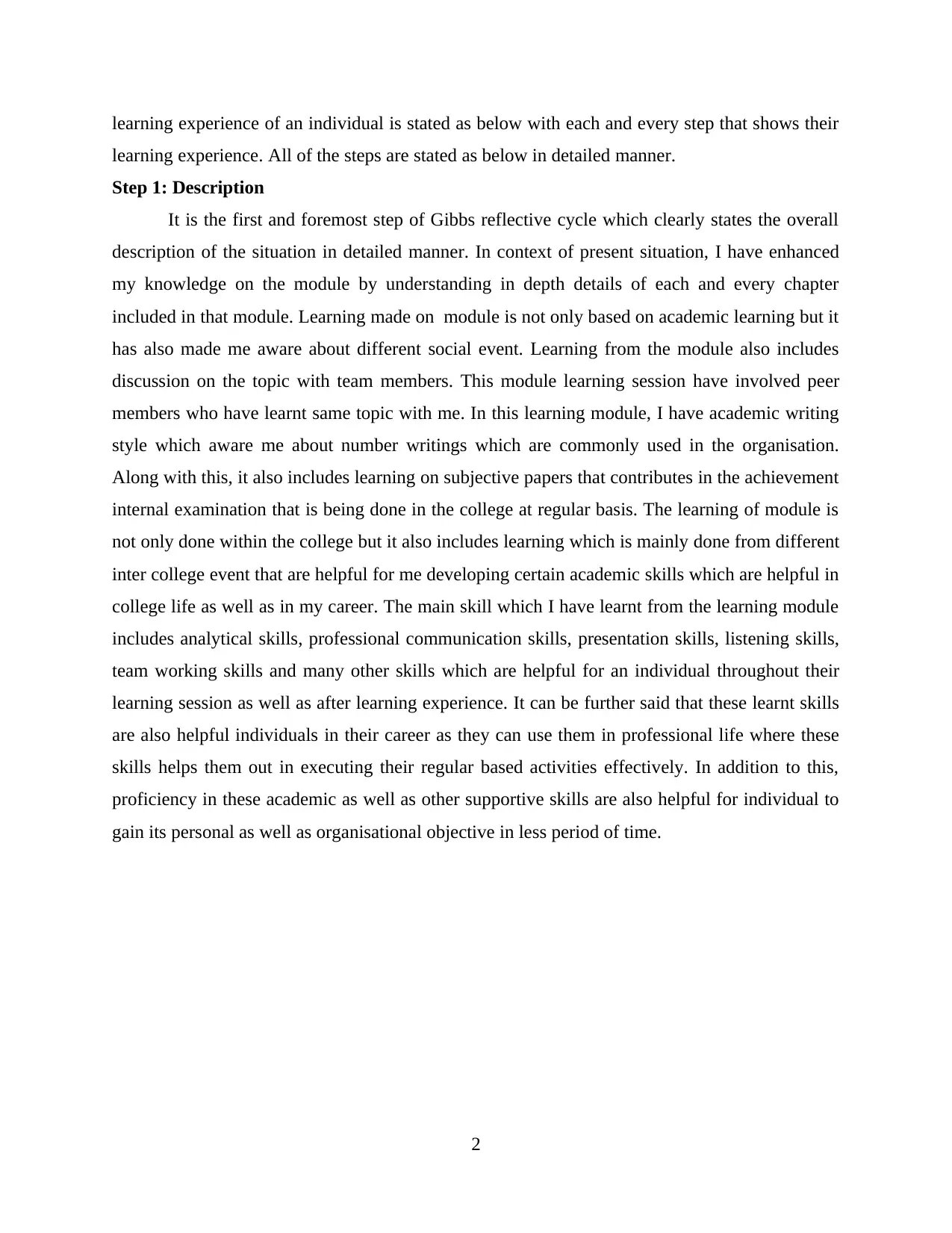
learning experience of an individual is stated as below with each and every step that shows their
learning experience. All of the steps are stated as below in detailed manner.
Step 1: Description
It is the first and foremost step of Gibbs reflective cycle which clearly states the overall
description of the situation in detailed manner. In context of present situation, I have enhanced
my knowledge on the module by understanding in depth details of each and every chapter
included in that module. Learning made on module is not only based on academic learning but it
has also made me aware about different social event. Learning from the module also includes
discussion on the topic with team members. This module learning session have involved peer
members who have learnt same topic with me. In this learning module, I have academic writing
style which aware me about number writings which are commonly used in the organisation.
Along with this, it also includes learning on subjective papers that contributes in the achievement
internal examination that is being done in the college at regular basis. The learning of module is
not only done within the college but it also includes learning which is mainly done from different
inter college event that are helpful for me developing certain academic skills which are helpful in
college life as well as in my career. The main skill which I have learnt from the learning module
includes analytical skills, professional communication skills, presentation skills, listening skills,
team working skills and many other skills which are helpful for an individual throughout their
learning session as well as after learning experience. It can be further said that these learnt skills
are also helpful individuals in their career as they can use them in professional life where these
skills helps them out in executing their regular based activities effectively. In addition to this,
proficiency in these academic as well as other supportive skills are also helpful for individual to
gain its personal as well as organisational objective in less period of time.
2
learning experience. All of the steps are stated as below in detailed manner.
Step 1: Description
It is the first and foremost step of Gibbs reflective cycle which clearly states the overall
description of the situation in detailed manner. In context of present situation, I have enhanced
my knowledge on the module by understanding in depth details of each and every chapter
included in that module. Learning made on module is not only based on academic learning but it
has also made me aware about different social event. Learning from the module also includes
discussion on the topic with team members. This module learning session have involved peer
members who have learnt same topic with me. In this learning module, I have academic writing
style which aware me about number writings which are commonly used in the organisation.
Along with this, it also includes learning on subjective papers that contributes in the achievement
internal examination that is being done in the college at regular basis. The learning of module is
not only done within the college but it also includes learning which is mainly done from different
inter college event that are helpful for me developing certain academic skills which are helpful in
college life as well as in my career. The main skill which I have learnt from the learning module
includes analytical skills, professional communication skills, presentation skills, listening skills,
team working skills and many other skills which are helpful for an individual throughout their
learning session as well as after learning experience. It can be further said that these learnt skills
are also helpful individuals in their career as they can use them in professional life where these
skills helps them out in executing their regular based activities effectively. In addition to this,
proficiency in these academic as well as other supportive skills are also helpful for individual to
gain its personal as well as organisational objective in less period of time.
2
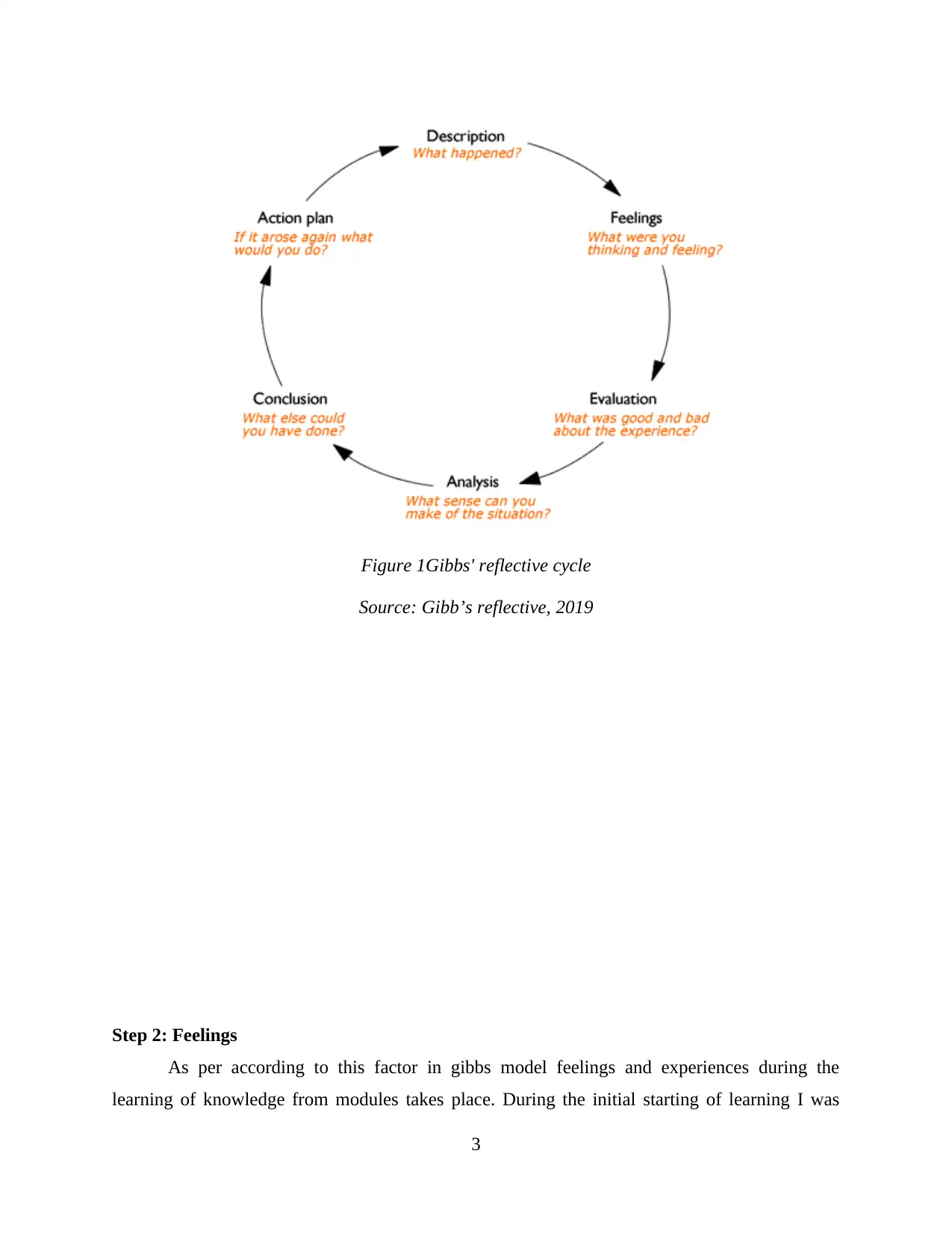
Figure 1Gibbs' reflective cycle
Source: Gibb’s reflective, 2019
Step 2: Feelings
As per according to this factor in gibbs model feelings and experiences during the
learning of knowledge from modules takes place. During the initial starting of learning I was
3
Source: Gibb’s reflective, 2019
Step 2: Feelings
As per according to this factor in gibbs model feelings and experiences during the
learning of knowledge from modules takes place. During the initial starting of learning I was
3
⊘ This is a preview!⊘
Do you want full access?
Subscribe today to unlock all pages.

Trusted by 1+ million students worldwide
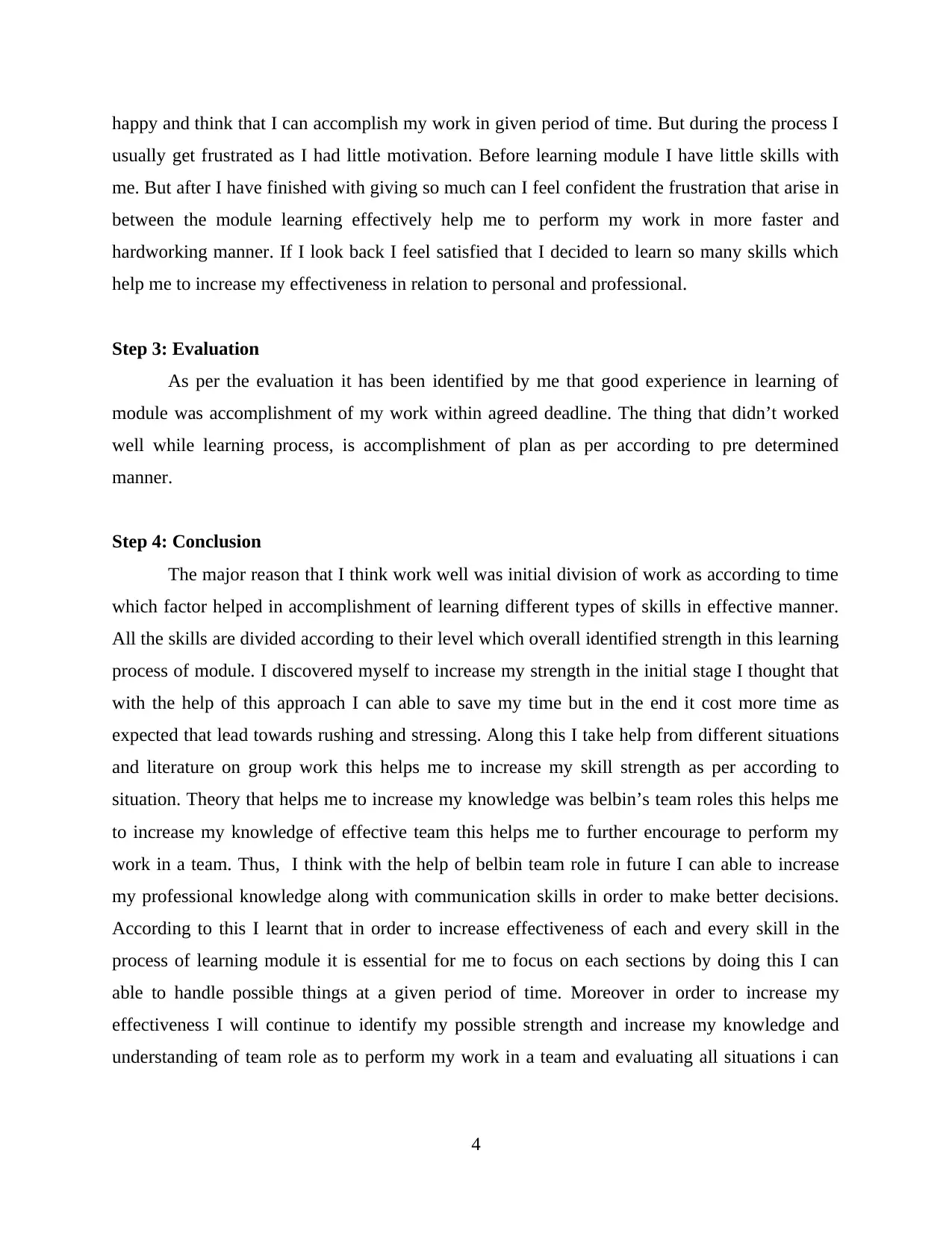
happy and think that I can accomplish my work in given period of time. But during the process I
usually get frustrated as I had little motivation. Before learning module I have little skills with
me. But after I have finished with giving so much can I feel confident the frustration that arise in
between the module learning effectively help me to perform my work in more faster and
hardworking manner. If I look back I feel satisfied that I decided to learn so many skills which
help me to increase my effectiveness in relation to personal and professional.
Step 3: Evaluation
As per the evaluation it has been identified by me that good experience in learning of
module was accomplishment of my work within agreed deadline. The thing that didn’t worked
well while learning process, is accomplishment of plan as per according to pre determined
manner.
Step 4: Conclusion
The major reason that I think work well was initial division of work as according to time
which factor helped in accomplishment of learning different types of skills in effective manner.
All the skills are divided according to their level which overall identified strength in this learning
process of module. I discovered myself to increase my strength in the initial stage I thought that
with the help of this approach I can able to save my time but in the end it cost more time as
expected that lead towards rushing and stressing. Along this I take help from different situations
and literature on group work this helps me to increase my skill strength as per according to
situation. Theory that helps me to increase my knowledge was belbin’s team roles this helps me
to increase my knowledge of effective team this helps me to further encourage to perform my
work in a team. Thus, I think with the help of belbin team role in future I can able to increase
my professional knowledge along with communication skills in order to make better decisions.
According to this I learnt that in order to increase effectiveness of each and every skill in the
process of learning module it is essential for me to focus on each sections by doing this I can
able to handle possible things at a given period of time. Moreover in order to increase my
effectiveness I will continue to identify my possible strength and increase my knowledge and
understanding of team role as to perform my work in a team and evaluating all situations i can
4
usually get frustrated as I had little motivation. Before learning module I have little skills with
me. But after I have finished with giving so much can I feel confident the frustration that arise in
between the module learning effectively help me to perform my work in more faster and
hardworking manner. If I look back I feel satisfied that I decided to learn so many skills which
help me to increase my effectiveness in relation to personal and professional.
Step 3: Evaluation
As per the evaluation it has been identified by me that good experience in learning of
module was accomplishment of my work within agreed deadline. The thing that didn’t worked
well while learning process, is accomplishment of plan as per according to pre determined
manner.
Step 4: Conclusion
The major reason that I think work well was initial division of work as according to time
which factor helped in accomplishment of learning different types of skills in effective manner.
All the skills are divided according to their level which overall identified strength in this learning
process of module. I discovered myself to increase my strength in the initial stage I thought that
with the help of this approach I can able to save my time but in the end it cost more time as
expected that lead towards rushing and stressing. Along this I take help from different situations
and literature on group work this helps me to increase my skill strength as per according to
situation. Theory that helps me to increase my knowledge was belbin’s team roles this helps me
to increase my knowledge of effective team this helps me to further encourage to perform my
work in a team. Thus, I think with the help of belbin team role in future I can able to increase
my professional knowledge along with communication skills in order to make better decisions.
According to this I learnt that in order to increase effectiveness of each and every skill in the
process of learning module it is essential for me to focus on each sections by doing this I can
able to handle possible things at a given period of time. Moreover in order to increase my
effectiveness I will continue to identify my possible strength and increase my knowledge and
understanding of team role as to perform my work in a team and evaluating all situations i can
4
Paraphrase This Document
Need a fresh take? Get an instant paraphrase of this document with our AI Paraphraser
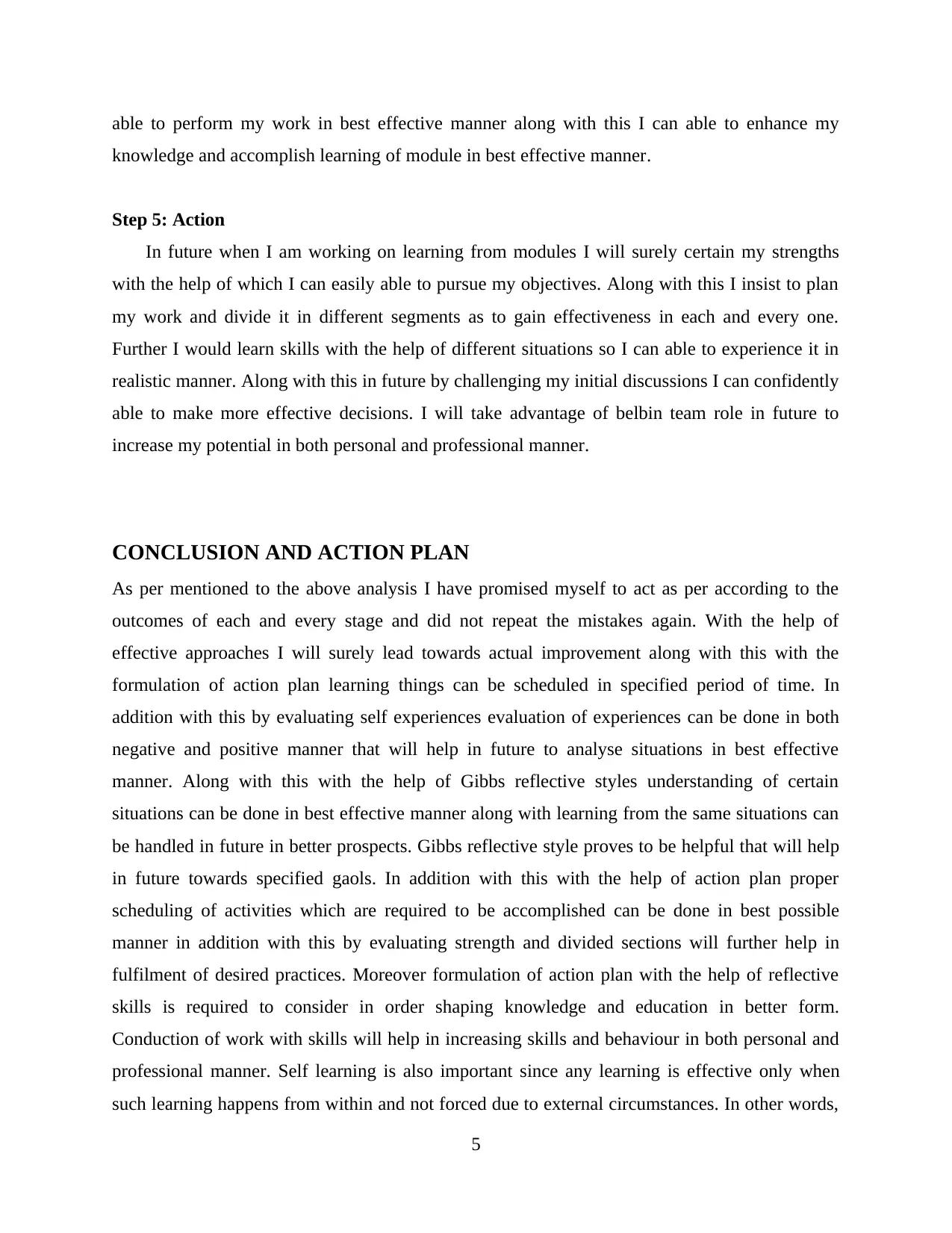
able to perform my work in best effective manner along with this I can able to enhance my
knowledge and accomplish learning of module in best effective manner.
Step 5: Action
In future when I am working on learning from modules I will surely certain my strengths
with the help of which I can easily able to pursue my objectives. Along with this I insist to plan
my work and divide it in different segments as to gain effectiveness in each and every one.
Further I would learn skills with the help of different situations so I can able to experience it in
realistic manner. Along with this in future by challenging my initial discussions I can confidently
able to make more effective decisions. I will take advantage of belbin team role in future to
increase my potential in both personal and professional manner.
CONCLUSION AND ACTION PLAN
As per mentioned to the above analysis I have promised myself to act as per according to the
outcomes of each and every stage and did not repeat the mistakes again. With the help of
effective approaches I will surely lead towards actual improvement along with this with the
formulation of action plan learning things can be scheduled in specified period of time. In
addition with this by evaluating self experiences evaluation of experiences can be done in both
negative and positive manner that will help in future to analyse situations in best effective
manner. Along with this with the help of Gibbs reflective styles understanding of certain
situations can be done in best effective manner along with learning from the same situations can
be handled in future in better prospects. Gibbs reflective style proves to be helpful that will help
in future towards specified gaols. In addition with this with the help of action plan proper
scheduling of activities which are required to be accomplished can be done in best possible
manner in addition with this by evaluating strength and divided sections will further help in
fulfilment of desired practices. Moreover formulation of action plan with the help of reflective
skills is required to consider in order shaping knowledge and education in better form.
Conduction of work with skills will help in increasing skills and behaviour in both personal and
professional manner. Self learning is also important since any learning is effective only when
such learning happens from within and not forced due to external circumstances. In other words,
5
knowledge and accomplish learning of module in best effective manner.
Step 5: Action
In future when I am working on learning from modules I will surely certain my strengths
with the help of which I can easily able to pursue my objectives. Along with this I insist to plan
my work and divide it in different segments as to gain effectiveness in each and every one.
Further I would learn skills with the help of different situations so I can able to experience it in
realistic manner. Along with this in future by challenging my initial discussions I can confidently
able to make more effective decisions. I will take advantage of belbin team role in future to
increase my potential in both personal and professional manner.
CONCLUSION AND ACTION PLAN
As per mentioned to the above analysis I have promised myself to act as per according to the
outcomes of each and every stage and did not repeat the mistakes again. With the help of
effective approaches I will surely lead towards actual improvement along with this with the
formulation of action plan learning things can be scheduled in specified period of time. In
addition with this by evaluating self experiences evaluation of experiences can be done in both
negative and positive manner that will help in future to analyse situations in best effective
manner. Along with this with the help of Gibbs reflective styles understanding of certain
situations can be done in best effective manner along with learning from the same situations can
be handled in future in better prospects. Gibbs reflective style proves to be helpful that will help
in future towards specified gaols. In addition with this with the help of action plan proper
scheduling of activities which are required to be accomplished can be done in best possible
manner in addition with this by evaluating strength and divided sections will further help in
fulfilment of desired practices. Moreover formulation of action plan with the help of reflective
skills is required to consider in order shaping knowledge and education in better form.
Conduction of work with skills will help in increasing skills and behaviour in both personal and
professional manner. Self learning is also important since any learning is effective only when
such learning happens from within and not forced due to external circumstances. In other words,
5
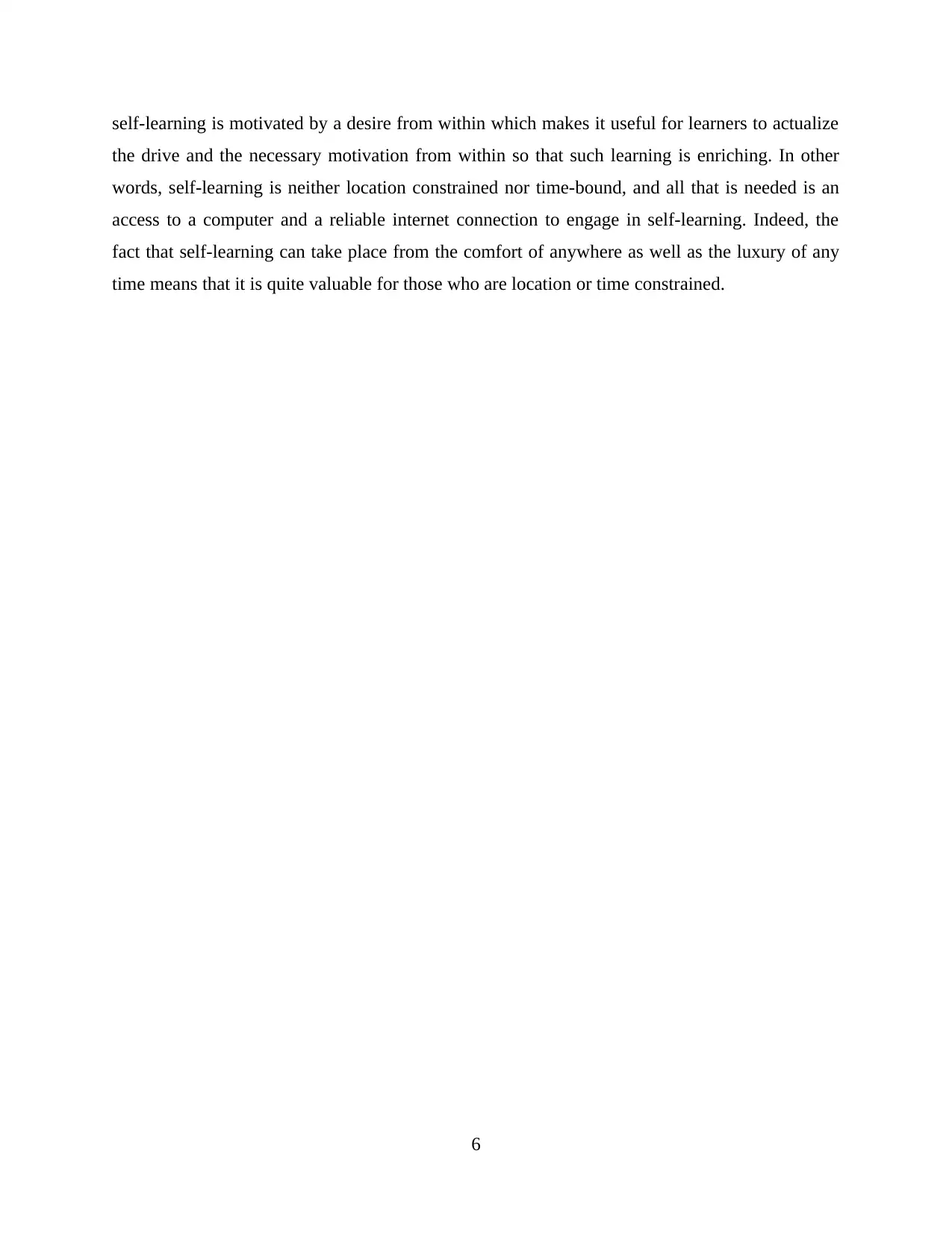
self-learning is motivated by a desire from within which makes it useful for learners to actualize
the drive and the necessary motivation from within so that such learning is enriching. In other
words, self-learning is neither location constrained nor time-bound, and all that is needed is an
access to a computer and a reliable internet connection to engage in self-learning. Indeed, the
fact that self-learning can take place from the comfort of anywhere as well as the luxury of any
time means that it is quite valuable for those who are location or time constrained.
6
the drive and the necessary motivation from within so that such learning is enriching. In other
words, self-learning is neither location constrained nor time-bound, and all that is needed is an
access to a computer and a reliable internet connection to engage in self-learning. Indeed, the
fact that self-learning can take place from the comfort of anywhere as well as the luxury of any
time means that it is quite valuable for those who are location or time constrained.
6
⊘ This is a preview!⊘
Do you want full access?
Subscribe today to unlock all pages.

Trusted by 1+ million students worldwide
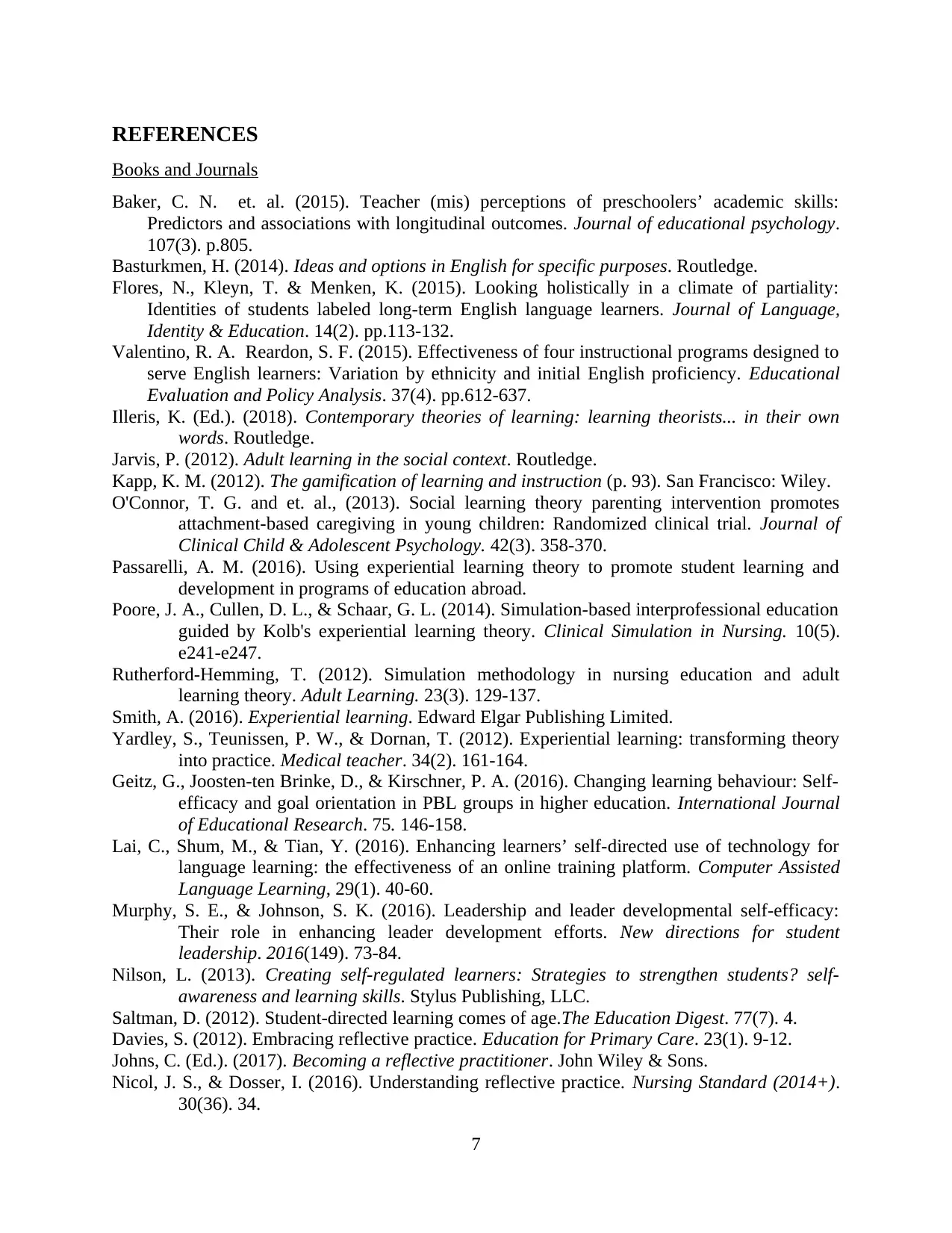
REFERENCES
Books and Journals
Baker, C. N. et. al. (2015). Teacher (mis) perceptions of preschoolers’ academic skills:
Predictors and associations with longitudinal outcomes. Journal of educational psychology.
107(3). p.805.
Basturkmen, H. (2014). Ideas and options in English for specific purposes. Routledge.
Flores, N., Kleyn, T. & Menken, K. (2015). Looking holistically in a climate of partiality:
Identities of students labeled long-term English language learners. Journal of Language,
Identity & Education. 14(2). pp.113-132.
Valentino, R. A. Reardon, S. F. (2015). Effectiveness of four instructional programs designed to
serve English learners: Variation by ethnicity and initial English proficiency. Educational
Evaluation and Policy Analysis. 37(4). pp.612-637.
Illeris, K. (Ed.). (2018). Contemporary theories of learning: learning theorists... in their own
words. Routledge.
Jarvis, P. (2012). Adult learning in the social context. Routledge.
Kapp, K. M. (2012). The gamification of learning and instruction (p. 93). San Francisco: Wiley.
O'Connor, T. G. and et. al., (2013). Social learning theory parenting intervention promotes
attachment-based caregiving in young children: Randomized clinical trial. Journal of
Clinical Child & Adolescent Psychology. 42(3). 358-370.
Passarelli, A. M. (2016). Using experiential learning theory to promote student learning and
development in programs of education abroad.
Poore, J. A., Cullen, D. L., & Schaar, G. L. (2014). Simulation-based interprofessional education
guided by Kolb's experiential learning theory. Clinical Simulation in Nursing. 10(5).
e241-e247.
Rutherford-Hemming, T. (2012). Simulation methodology in nursing education and adult
learning theory. Adult Learning. 23(3). 129-137.
Smith, A. (2016). Experiential learning. Edward Elgar Publishing Limited.
Yardley, S., Teunissen, P. W., & Dornan, T. (2012). Experiential learning: transforming theory
into practice. Medical teacher. 34(2). 161-164.
Geitz, G., Joosten-ten Brinke, D., & Kirschner, P. A. (2016). Changing learning behaviour: Self-
efficacy and goal orientation in PBL groups in higher education. International Journal
of Educational Research. 75. 146-158.
Lai, C., Shum, M., & Tian, Y. (2016). Enhancing learners’ self-directed use of technology for
language learning: the effectiveness of an online training platform. Computer Assisted
Language Learning, 29(1). 40-60.
Murphy, S. E., & Johnson, S. K. (2016). Leadership and leader developmental self‐efficacy:
Their role in enhancing leader development efforts. New directions for student
leadership. 2016(149). 73-84.
Nilson, L. (2013). Creating self-regulated learners: Strategies to strengthen students? self-
awareness and learning skills. Stylus Publishing, LLC.
Saltman, D. (2012). Student-directed learning comes of age.The Education Digest. 77(7). 4.
Davies, S. (2012). Embracing reflective practice. Education for Primary Care. 23(1). 9-12.
Johns, C. (Ed.). (2017). Becoming a reflective practitioner. John Wiley & Sons.
Nicol, J. S., & Dosser, I. (2016). Understanding reflective practice. Nursing Standard (2014+).
30(36). 34.
7
Books and Journals
Baker, C. N. et. al. (2015). Teacher (mis) perceptions of preschoolers’ academic skills:
Predictors and associations with longitudinal outcomes. Journal of educational psychology.
107(3). p.805.
Basturkmen, H. (2014). Ideas and options in English for specific purposes. Routledge.
Flores, N., Kleyn, T. & Menken, K. (2015). Looking holistically in a climate of partiality:
Identities of students labeled long-term English language learners. Journal of Language,
Identity & Education. 14(2). pp.113-132.
Valentino, R. A. Reardon, S. F. (2015). Effectiveness of four instructional programs designed to
serve English learners: Variation by ethnicity and initial English proficiency. Educational
Evaluation and Policy Analysis. 37(4). pp.612-637.
Illeris, K. (Ed.). (2018). Contemporary theories of learning: learning theorists... in their own
words. Routledge.
Jarvis, P. (2012). Adult learning in the social context. Routledge.
Kapp, K. M. (2012). The gamification of learning and instruction (p. 93). San Francisco: Wiley.
O'Connor, T. G. and et. al., (2013). Social learning theory parenting intervention promotes
attachment-based caregiving in young children: Randomized clinical trial. Journal of
Clinical Child & Adolescent Psychology. 42(3). 358-370.
Passarelli, A. M. (2016). Using experiential learning theory to promote student learning and
development in programs of education abroad.
Poore, J. A., Cullen, D. L., & Schaar, G. L. (2014). Simulation-based interprofessional education
guided by Kolb's experiential learning theory. Clinical Simulation in Nursing. 10(5).
e241-e247.
Rutherford-Hemming, T. (2012). Simulation methodology in nursing education and adult
learning theory. Adult Learning. 23(3). 129-137.
Smith, A. (2016). Experiential learning. Edward Elgar Publishing Limited.
Yardley, S., Teunissen, P. W., & Dornan, T. (2012). Experiential learning: transforming theory
into practice. Medical teacher. 34(2). 161-164.
Geitz, G., Joosten-ten Brinke, D., & Kirschner, P. A. (2016). Changing learning behaviour: Self-
efficacy and goal orientation in PBL groups in higher education. International Journal
of Educational Research. 75. 146-158.
Lai, C., Shum, M., & Tian, Y. (2016). Enhancing learners’ self-directed use of technology for
language learning: the effectiveness of an online training platform. Computer Assisted
Language Learning, 29(1). 40-60.
Murphy, S. E., & Johnson, S. K. (2016). Leadership and leader developmental self‐efficacy:
Their role in enhancing leader development efforts. New directions for student
leadership. 2016(149). 73-84.
Nilson, L. (2013). Creating self-regulated learners: Strategies to strengthen students? self-
awareness and learning skills. Stylus Publishing, LLC.
Saltman, D. (2012). Student-directed learning comes of age.The Education Digest. 77(7). 4.
Davies, S. (2012). Embracing reflective practice. Education for Primary Care. 23(1). 9-12.
Johns, C. (Ed.). (2017). Becoming a reflective practitioner. John Wiley & Sons.
Nicol, J. S., & Dosser, I. (2016). Understanding reflective practice. Nursing Standard (2014+).
30(36). 34.
7
Paraphrase This Document
Need a fresh take? Get an instant paraphrase of this document with our AI Paraphraser

8
1 out of 11
Related Documents
Your All-in-One AI-Powered Toolkit for Academic Success.
+13062052269
info@desklib.com
Available 24*7 on WhatsApp / Email
![[object Object]](/_next/static/media/star-bottom.7253800d.svg)
Unlock your academic potential
Copyright © 2020–2026 A2Z Services. All Rights Reserved. Developed and managed by ZUCOL.




